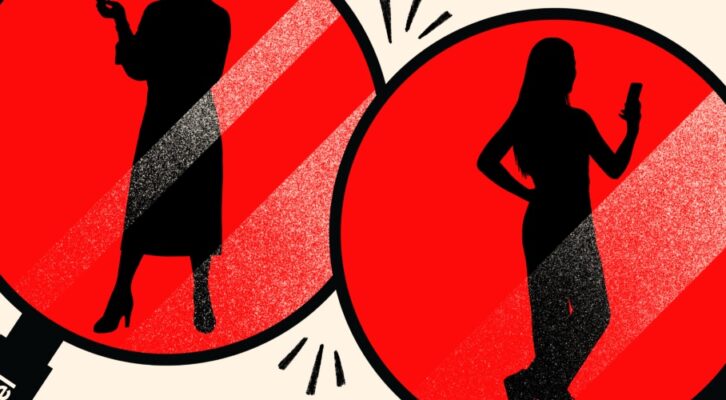Dylanalia, Deep Data, and More: New and Noteworthy Nonfiction This May
Featuring New Books by Olivia Laing, Sarah Schulman, and Annette Gordon-Reed
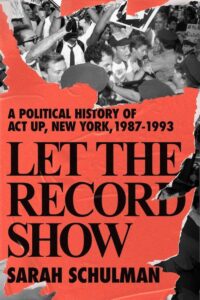
Sarah Schulman, Let the Record Show: A Political History of ACT UP New York, 1987-1993
(FSG)
In the 1980s, the group of individuals in ACT UP—working against powerful national forces of ignorance, bigotry, and hatred—forced the country, through collective action and sheer willpower, to address HIV/AIDS, making it possible for future generations to live. Sarah Schulman’s Let the Record Show is an account of that history from the perspective of its New York chapter in the period between 1987 and 1993, drawn from 188 interviews with former members and including her own perspective as a reporter and volunteer with ACT UP. The book is a monumental achievement, the culmination of decades of work, and almost unbelievable in its scope and scale. Its construction is also a lesson in community storytelling; from long profiles of former members and extended transcripts of their interviews, to detailed insights into the day-to-day workings of the group, Let the Record Show honors the humanity of those involved to an extent that no other history of AIDS has achieved. –Corinne Segal, Lit Hub Senior Editor
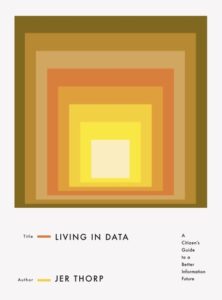
Jer Thorp, Living in Data: A Citizen’s Guide to a Better Information Future
(MCD)
In his introduction to Living in Data, data artist Jer Thorp makes an admission: “Living in data today is, for the most part, terrible.” How can individuals confront the staggering scale of data collection, and the shrouding of its use by private entities, without losing our minds? Thorp opens another, less anxiety-inducing, view of data by showing a multitude of different ways that data sets can help people understand the world and describing the activists who are working to give people agency over their own information. “‘Closing the loop’ between data and the people from whom the data comes,” as Thorp puts it, is an important first step in that process. –Corinne Segal, Lit Hub Senior Editor
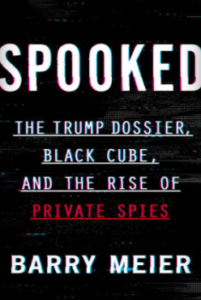
Barry Meier, Spooked: The Trump Dossier, Black Cube, and the Rise of Private Spies
(Harper Books)
Is it any surprise that a surveillance-industrial complex built up over a half-century of global spy vs. spy has left us with a surfeit of spooks for hire? Just as the last 25 years has seen huge growth in the for-profit private security sector (soldiers for hire!) so too are we in the middle of a private spy boom. But the extent of that boom, as Barry Meier reveals in Spooked, will probably shock you. From Harvey Weinstein to the Steele Dossier, if you have the money you can buy the spies, either to dig up the dirt on people (in the case of the latter) or ruin their lives (the former). Spooked is a horrible, fascinating account of just how far the modern surveillance state has leeched in the private sector—and into private lives. –Jonny Diamond, Lit Hub Editor-in-Chief
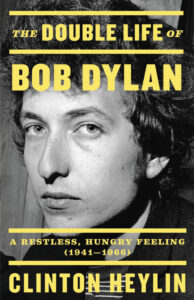
Clinton Heylin, The Double Life of Bob Dylan: A Restless, Hungry Feeling, 1941-1966
(Little, Brown & Company)
It’s hard to come up with another living figure who’s inspired such a legion of devoted (and largely amateur) biographers as Bob Dylan. The ultimate in unreliable narrators Dylan has left a seemingly infinite and winding trail of biographical details that are equal parts myth, fantasy, misdirection, and, maybe, just the tiniest bit of fact. But Clinton Heylin is no amateur… Having already written eight books about the man born Robert Zimmerman, Heylin takes full advantage of newly available archive material, bought in 2016 for $22 million by the George Kaiser Foundation, and said to contain a wealth of hitherto unknown Dylanalia—so much that this biography is coming in two parts, the first weighing in at a breezy 700 pages. –Jonny Diamond, Lit Hub Editor-in-Chief
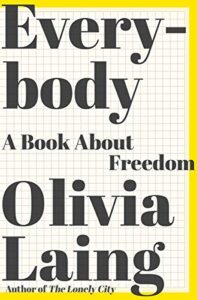
Olivia Laing, Everybody: A Book About Freedom
(W. W. Norton)
We are lucky to be living in the time of Olivia Laing. Whether she’s writing about rivers or alcoholics or urban loneliness, to spend time with Laing as she works through a topic, finding the unlikeliest of connective ideas wherever she looks, is to come away with a view of the world that—if not exactly clearer—is strange and rich and profound. Her latest book, Everybody, delves into the body itself and our relationship to it, investigating ideas from the likes of Susan Sontag, Andrea Dworkin, Nina Simone, and Christopher Isherwood. At the center of it all is the slightly unhinged work of Austrian psychoanalyst Wilhelm Reich, who gave us the term “sexual revolution” way back in the 1930s, and whose radical-mystical view of sex and the body provide the framework for Laing’s provocative wanderings. –Jonny Diamond, Lit Hub Editor-in-Chief
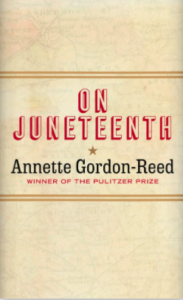
Annette Gordon-Reed, On Juneteenth
(Liveright)
Annette Gordon-Reed’s groundbreaking work as a historian continues with On Juneteenth, an analysis of the events that led to the declaration of the end of slavery in Texas alongside her personal story of growing up there a century later. In school, she writes, the topic of slavery “didn’t figure prominently enough in our lessons to give us a clear and complete picture of the role the institution played in the state’s early development.” The relationship between the state and its own history is the main object of her study; rethinking this history, and seeing it clearly, is crucial to continuing our national reckoning with race today. –Corinne Segal, Lit Hub Senior Editor

Kyle Schlesinger (editor), A Poetics of the Press: Interviews with Poets, Printers, & Publishers
(Ugly Duckling Presse)
If you’re the specific kind of nerd who jumped at this title (which I definitely am), you will love this book. Comprised of sixteen interviews with independent publishers of poetry, including Chax Press, Granary Books, and Ugly Duckling Presse, A Poetics of the Press is an extended love letter to the people, materials, and editorial care behind the printed word. Though the book’s subjects address a relatively niche topic, and do so with the language of specialists (hanging quotes! Offset and letterpress printing! “Eric Gill’s twelve-point Perpetua type”!), it is still an accessible and engrossing immersion into a life defined by printing. –Corinne Segal, Lit Hub Senior Editor

Phoebe S.K. Young, Camping Grounds: Public Nature in American Life from the Civil War to the Occupy Movement
(Oxford University Press)
As a freshly vaccinated America (well, some of us, anyway) prepares to unleash itself on the great outdoors this summer, it’s worth taking a moment to think about what wilderness really means in a nation obsessed with its own myths of pristine frontiers and the rugged (white) few who tamed them. And why is it, exactly, that Americans spend billions of dollars every year for the pleasure of sleeping outside, among the rocks and the trees, away from their perfectly comfortable beds? What informs our desire to sleep outside, and can it be separated from class, race, and politics? These questions—and many more—feature in Phoebe S.K. Young’s provocative history of American camping, which traces the inclination to “rough it by choice” from the Civil War through the Great Depression and all the way to the Occupy Movement. –Jonny Diamond, Lit Hub Editor-in-Chief
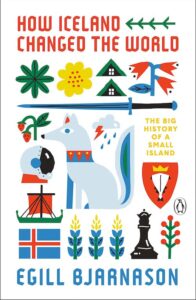
Egill Bjarnason, How Iceland Changed the World: The Big History of a Small Island
(Penguin Books)
Look, even if we only considered the existence of Bjork, it would be enough to talk about how Iceland changed the world. But… There’s more! Egill Bjarnason takes an extensive look at how this tiny, rugged, beautiful, elf-ridden island in the north Atlantic has long hit well above its weight. From modern democracy to the founding of Israel to the Moon Landing (seriously), Iceland has played a role in some of humankind’s epoch-changing moments. How, you ask, does an isolated island nation with fewer people than the city of Colorado Springs have such an outsized impact on the world? Well, you’ll have to read the book to find out, but it’s not not elves. –Jonny Diamond, Lit Hub Editor-in-Chief
*
HONORARY MENTIONS FROM APRIL

Allison Cobb, Plastic: An Autobiography
(Nightboat Books)
Plastic, as Cobb describes, embodies the “infinite desire” that drives American consumption—it is this desire, more than anything, that provokes her fascination with the topic. Her exploration of plastic incorporates history, mythology, philosophy, and personal storytelling, forming a powerful, experimental testimony to our global reliance on plastic and the urgent environmental crisis that its production has caused. –Corinne Segal, Lit Hub Senior Editor

Jan Morris, Allegorizings
(Liveright)
Even toward the end of her life, as she wrote the essays that would become the posthumously published Allegorizings, Jan Morris retained an inimitable voice: compassionate, humorous, and perpetually delighted and puzzled alike by the world. This book is a gift, one that contains reflections on her past work, new anecdotes and stories of her travels, and thoughts on old age, which, she declares, “is the right to be absolutely ourselves. Laugh, cry, satirize it, my friends, when your time comes — but make the most of it too!” –Corinne Segal, Lit Hub Senior Editor














